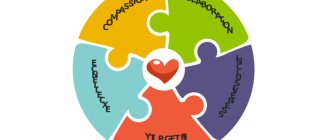Personality is a complex, multi-layered formation that has its own hierarchy. In Russian psychology, the highest level of personality structure is called orientation. This is a system of values, beliefs and attitudes that are formed during life. They largely guide a person’s activities and determine his attitude towards the world, himself and other people.
Values, their types and hierarchy
Everything in our life has its own value, and we are talking here not only about material or monetary terms. But the value of objects and phenomena is different. There are things that are of fundamental importance, and there are those that we can easily abandon in favor of others that are more significant and valuable. This value system largely determines our life choices, our careers, hobbies, principles, and relationships with others.
Types of values
In psychology, values mean objects, phenomena, ideals, etc. that are significant for a person. Each of us has such significant things in different areas of life, and their content is also different. There are 3 types of values.
Material values
These include real objects of the surrounding world that are necessary for a person to feel comfortable. Some of them are vital, for example, clothing, housing, food. And others can be classified as luxury or increased comfort items - cars, household appliances, smartphones, jewelry, accessories, etc. A person can do without them, but for many these things are a symbol of well-being, and owning them is considered prestigious. That is, these things have a transitory value, which is determined either by fashion or by the subjective preferences of a person.
Spiritual values
They are often contrasted with material ones and are considered more sublime and significant for humans and humanity as a whole. However, this is not always the case. Spiritual values are a product of human consciousness, and their significance is determined primarily by cultural traditions, moral norms, ideological principles, etc. You must agree that the spiritual values of the Middle Ages were not always of a sublime nature, and not all of them are significant for modern man .
There are, of course, universal human values that are important in any society and in any historical era. These include freedom, family, love, friendship, loyalty and devotion, and a sense of duty.
From the point of view of human evolution, spiritual values were formed later than material ones and include several types:
- life values associated with universal human norms and of fundamental importance for people’s lives: love, faith, freedom, family, health, protection of offspring, etc.;
- moral values reflect a person’s attitude to the basic categories of morality: honesty and fidelity, humanism and compassion, duty and respect;
- aesthetic values, perhaps the youngest of all types, associated with aesthetic experiences, such as a sense of beauty, enjoyment of form, sound, color, etc.; aesthetic values are determined by cultural traditions.
Speaking about the superiority of spiritual values over material ones, we should not forget about their subjective, individual nature. So, perhaps, for one person, fidelity to duty will be a significant value, but for another it will have no meaning at all. Some will be faithful to the chosen principles of humanism, while others will promote unprincipledness and misanthropy.
Social values
This type of values is associated with interpersonal relationships and a person’s idea of the role of society and his place in it. Social values include the following:
- belonging to a particular social group;
- circle of friends;
- Friends;
- communication skills;
- political views and beliefs;
- social status in the hierarchy of interpersonal relationships.
Man is part of society, and the normal life of even the most withdrawn and unsociable individual is impossible outside of society. Therefore, social values are objective and significant for any person, even if he is not always aware of it.
Terminal and instrumental values
In psychology, these two types of values were described by M. Rokeach (USA), the author of a well-known method of psychological diagnostics of a person’s value orientations.
Terminal values are understood as basic values that are significant in themselves. These include spiritual and social values, and vitally important material ones, for example, friendship, beauty, education, career, family, creativity, health, freedom, comfort, etc. Sometimes terminal values are compared with the goals of life that one sets for one’s life. yourself as a person. This is what we strive for.
Instrumental values, as the name suggests, are tools for achieving life goals. Terminal values include, first of all, personality traits, for example, perseverance, hard work, responsibility, creativity, curiosity, will, tolerance, open-mindedness, etc. This is what we value in other people and in ourselves, what we believe necessary to develop.
Hierarchy of values
Since values have different weights and different significance, in psychology it is customary to talk about a hierarchy of values. It can be presented in the form of a pyramid of several steps or levels, and the structure of the pyramid is different for each person.
For some, the pinnacle will be success, career, material well-being, expressed in a car of a particular brand or penthouse. And another person will have love and a happy family at the top of the hierarchy of values. It is believed that spiritual values are more important and significant than material ones, but not everyone has them at the upper levels of the pyramid.
No less important is what values underlie our lives and form the basis of the hierarchy. Some people consider family to be such a solid foundation, others consider material wealth, while others consider man as the measure of all things at the base of the pyramid.
Features of the formation of a system of life values
The system of life values of each person begins to form from the first years of his life, but it is finally formed only upon reaching a responsible age, i.e. by about 18-20 years, although even after that it may change in some ways. The process of its formation itself takes place according to a certain algorithm.
Schematically, this algorithm can be expressed as follows:
- Aspiration > Ideal
- Aspiration > Goal > Ideal
- Aspiration > Values > Purpose > Ideal
- Aspiration > Means > Values > Goal > Ideal
However, subsequently, between all these points, another one appears - ethics, as a result of which the whole scheme takes on the following form:
- Striving > Ethics > Means > Ethics > Values > Ethics > Goal > Ethics > Ideal
From this it turns out that first of all, the ideal and the very desire for this ideal arise. An ideal, which can also be called an image, if there is no desire for it, is no longer such.
At the first stage, which is most often instinctive, the ideal is neutral from an ethical point of view, i.e. it cannot be assessed in any way, and it can be formed in the form of a sensory-emotional substance, the content of which is quite difficult to determine. The meaning that is attached to the ideal is formed only at the stage of transformation into a goal. And only after this, reaching the third stage, values are formed that serve as resources, conditions and rules for achieving the goal that leads to the ideal. And the entire algorithm ultimately ends with the so-called inventory of the necessary and available means to achieve the goal.
Each element of the presented algorithm is extremely important, but you need to pay attention to the fact that the ideal, goal and means are formed and selected under the influence of not only needs, but also ethical norms, which seem to “filter” all stages of the algorithm. At the same time, ethical standards may exist in the human mind, as well as in the mass consciousness, representing the results of the action of previous algorithms, and therefore be perceived as “existing objectively.” In addition, they can also be formed as new ones, being conditioned by a newly emerged ideal and the corresponding algorithm.
The life of any person, as we have already mentioned, from childhood begins to obey this algorithm, and it does not matter what it concerns: the choice of a future profession, a loved one, political or religious views and actions performed. And here “ideals” play a special role, regardless of whether they exist in a person’s consciousness or in his subconscious.
To summarize, we can say that a person’s system of life values is a fairly stable structure, despite the fact that it is subject to changes, both small and global. And a person’s awareness of his system of life values is the first step towards understanding his life purpose.
We also recommend reading:
- Storytelling
- Axiology
- Social anxiety
- 7-S structure
- Theories and concepts of Emile Durkheim
- Definition of values
- Spiral dynamics model
- Brian Tracy: "Live Simpler": Key Ideas
- Graves' Spiral Dynamics: Pathways to Human Development
- The main life values of people: what is most important in life and how to understand it?
- The influence of social roles on personality development
Key words:1Self-knowledge
Personal Beliefs
In psychology, beliefs are understood as a person’s system of views on the world and his place in it, on relationships with other people and attitude to business. Beliefs are formed throughout an individual's life under the influence of the social environment and personal experience.
The dominant role is played by the social factor; therefore, the foundations of beliefs are laid in our consciousness by society. The authority of the source and the faith factor are of great importance. Children trust their parents and teachers; they are authorities for them, and therefore have a decisive influence on the formation of their worldview. And adults believe in politicians (although they don’t always admit it), the media, authoritative friends and books. It is these sources that have the most noticeable influence on a person’s beliefs.
However, it is also impossible to call a person a passive object of social influence. He passes through himself and processes any information, correlates it with existing experience and significant values. Therefore, we can say that beliefs are a kind of fusion of the social and the individual.
Beliefs play an important role in a person's life. They largely determine his social position and personality orientation. Beliefs are also closely related to life goals and attitudes.
The role of values in the life of society
This category, in addition to representing some significance for society, also plays a certain role. For example, a person’s mastery of various values contributes to the acquisition of social experience, as a result of which he becomes involved in culture, and this, in turn, affects the formation of his personality. Another important role of values in society is that a person strives to create new goods, while preserving old ones that already exist. In addition, the value of thoughts, actions, and various things is expressed in how important they are for the process of social development, that is, the progress of society. And on a personal level – human development and self-improvement.
Attitudes, their types and role in human life
Attitudes are an ambiguous concept; in psychology it is used in two meanings:
- as a certain, predetermined perspective of perception of reality, events, people;
- as a predisposition to a certain behavior or type of social activity.
In general, an attitude can be considered as a person’s readiness to perform certain actions and actions. For example, before crossing the road, a person usually automatically checks to see if a car is moving. This triggers an attitude formed in childhood. Or another example: seeing through the window that it is cloudy and windy outside, we dress warmer, as the setting is triggered - if there is wind, then it is cold.
These are the so-called everyday attitudes, and ideological attitudes are in many ways close to beliefs, connected with them and often formed in inextricable unity. For example, a person with nationalist beliefs has attitudes toward perceiving people of other nationalities as less valuable, flawed, and endowed with unpleasant qualities.
Unlike beliefs, attitudes are less conscious. For example, there is such a widespread attitude that the higher a person’s social status, the smarter, more educated, and more professional he is. Therefore, without realizing why, we trust the opinion of our boss more than that of a subordinate or even a colleague.
Types of installations
In psychology, there are 3 types of attitudes depending on their influence on a certain area of activity:
- Meaningful attitudes relate to the content of our consciousness and include several components: behavioral – associated with the willingness to act in accordance with beliefs; informational, forming a person’s belief system; evaluative, influencing a person’s attitude to the world and expressed in emotions of sympathy and antipathy.
- Goal settings define the process of goal setting. This type of attitude includes, for example, the idea of the importance of career growth and the need for hard work to achieve success, or the conviction of a girl who associates her future exclusively with marriage. Goal settings support a person’s activity in case of failure and encourage him to start moving towards the goal again and again.
- Operational settings control the choice of ways and means to achieve a goal. This type is perhaps the least stable. Attitudes change under the influence of the learning process, personal experience, advice from others, information from various external sources (books, the Internet, etc.). No matter how inert a person’s thinking may be, he will never endlessly perform actions that do not bring results, but will try to find something more effective.
The identification of these types is rather arbitrary; in the real consciousness of a person, all attitudes are intertwined and interconnected.
Main types of values
As noted above, the main types of values are material (life-enhancing) and spiritual. The latter give a person moral satisfaction. The main types of material assets are the simplest goods (housing, food, household items, clothing, etc.) and goods of a higher order (means of production). However, both contribute to the functioning of society, as well as to improving the quality of life of its members. And people need spiritual values for the formation and further development of their worldviews, as well as their worldview. They contribute to the spiritual enrichment of the individual.
Classification
There are several classifications. For example, by type of needs. According to it, a distinction is made between material and spiritual values. But according to their significance, the latter are false and true. Classification is also carried out according to areas of activity, depending on their carrier, and according to the time of action. According to the first, they distinguish between economic, religious and aesthetic, the second - universal, group and personal values, and the third - eternal, long-term, short-term and momentary. In principle, there are other classifications, but they are too narrow.











